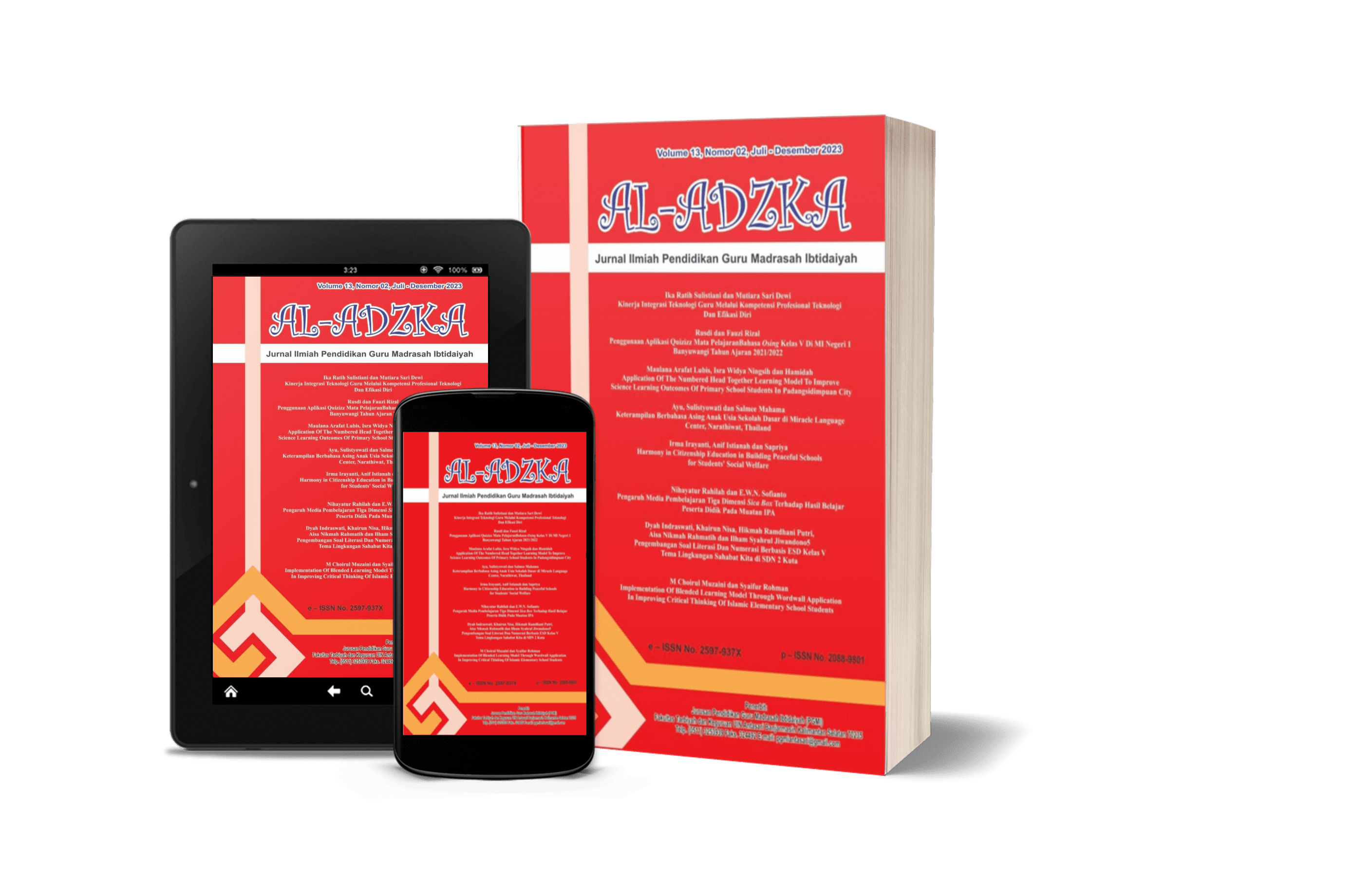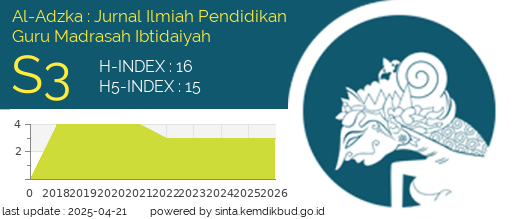The Use of Pancasila Smart Book to Improve Basic Literacy of Indonesia Immigrant Workers Children in Malaysia
DOI:
https://doi.org/10.18592/aladzkapgmi.v15i1.16193Keywords:
Smart Book, Learning Media, Literacy, Pancasila Learning, Imigrant ChildrenAbstract
Students' early reading skills at the Sanggar Bimbingan (SB) in Hulu Langat, Malaysia, often present a challenge that impacts the effectiveness of the learning process. Many children of Indonesian migrant workers face difficulties in developing reading skills and have a limited understanding of Pancasila values. To address this issue, the Smart Book Pancasila was introduced as an innovative learning tool designed to create a more engaging and interactive learning environment. This study explores how the Smart Book Pancasila helps improve early reading abilities and the comprehension of Pancasila values among students at SB Hulu Langat. Using a descriptive qualitative approach, data was collected through interviews, observations, and documentation. The primary informants included administrators, teachers, and students. The findings indicate that the use of the Smart Book in Pancasila learning contributes positively to the improvement of students' reading skills. Using interactive visuals and engaging content helps students better understand reading material while also internalizing the values of Pancasila. Thus, the Smart Book Pancasila is an effective alternative strategy for early literacy development, particularly for children with limited access to formal education.References
Anisawati, N. (2022). Konstruksi Sosial : Jurnal Penelitian Ilmu Sosial Perlindungan dan Penegakkan Hak Asasi Manusia untuk Tenaga Kerja. 1(4), 129–136. https://doi.org/10.56393/konstruksisosial.v1i10.1333
Asiya, S., Umam, K., Suhardi, A., & Arpilleda, A. J. (2024). Development and Utilization of Domino Card Media in Thematic Learning of Mathematics for Elementary School Students. 14(2), 176–188. https://doi.org/10.18952/aladzkapgmi.v14i2.13951
Bagasta, A. R., Rahmawati, D., M, D. M. F. Y., Wahyuni, I. P., & Prayitno, B. A. (2018). Profil Kemampuan Literasi Sains Peserta Didik di Salah Satu SMA Negeri Kota Sragen. Pedagogia : Jurnal Pendidikan, 7(2), 121–129. https://doi.org/10.21070/pedagogia.v7i2.1551
Bandura, A. (1969). Social Learning Theory of Identificatory Processes. In Handbook of socialization theory and research (Vol. 213, p. 262).
Dewi, A. C., Rachman, N. A., & Imran, M. Al. (2023). Lack of Interest in Reading Can Have a Negative Impact on Academic Achievement. 1(2), 273–282. https://doi.org/10.59890/ijgsr.v1i2.600
Hadi, Y., Remanita, Y., Tao-Tao, L. L. M., & Sunoko, A. (2025). Teacher-Centered Learning and Creative Reflection Approaches in Deaf Islamic Education Learning. Journal of Educational Research and Practice, 3(1), 69–89. https://doi.org/10.70376/jerp.v3i1.29
Hariyanti, H., Permady, G. C., Irayanto, I., Kartasasmita, S., & Istianah, A. (2024). Developing Ideological Intelligence in Schools: Appreciation and Practice of Pancasila Values through Extracurricular Activities. Al-Adzka: Jurnal Ilmiah Pendidikan Guru Madrasah Ibtidaiyah, 14(1), 79–91. https://doi.org/10.18592/aladzkapgmi.v14i1.12265
Jayana, T. A. (2021). Konsep Belajar Dalam Perspektif Anwar Muhammad Al-Syarqawi Dan Albert Bandura Serta Implikasinya Dalam Pembelajaran Di Sekolah. Jurnal Al-Murabbi, 7(1), 31–44. https://doi.org/10.35891/amb.v7i1.2716
Kartika Putri, R. W., & Suyitno, S. (2023). Strengthening the Pancasila Student Profile Through Hizbul Wathan Extracurricular Activities. Al-Adzka: Jurnal Ilmiah Pendidikan Guru Madrasah Ibtidaiyah, 13(2), 120–131. https://doi.org/10.18592/aladzkapgmi.v13i2.9383
Khaedir, M., & Nurdiyanti, A. (2025). Cultural Diversity In Pancasila Philosophy: A Contribution For Social And National Identity Awareness. 24(2), 19–32. https://dx.doi.org/10.33592/pelita.v24i2.6276
Marbun, J. B., & Nasution, D. K. (2025). Efforts to Improve Letter Recognition Skills Using Flashcards among Students at the Muhammadiyah Guidance Center ,. 10(2), 152–163. https://doi.org/10.31004/jele.v10i2.771
Mariantini, L., Wibawa, I. M. C., & Suarjana, I. M. (2022). Media Buku Pintar Meningkatkan Hasil Belajar Keterampilan Dasar Siswa Kelas I Sekolah Dasar. Mimbar PGSD Undiksha, 10(3), 550–558. https://doi.org/10.23887/jjpgsd.v10i3.49510
Maryani, D., Cholidah, N., Sulistyaningsih, F., Sutama, & Fatoni, A. (2021). Analysis of Education Character Policy to Realize Pancasila’s Value to Elementary School Students. Bulletin of Science Education, 1(1), 60–67. https://doi.org/10.51278/bse.v4i2.1314
Milles, Huberman, & Saldana. (2014). Qualitative Data Analysis. SAGE Publications. https://books.google.co.id/books?id=3CNrUbTu6CsC
Munarni Aswindo, Margaretha Hanita, & Arthur Josias Simon. (2021). Kerentanan dan Ketahanan Pekerja Migran Indonesia di Malaysia pada Masa Pandemi Covid-19. Jurnal Lemhannas RI, 9(1), 1–10. https://doi.org/10.55960/jlri.v9i1.372
Munawir, M., Rofiqoh, A., & Khairani, I. (2024). Peran Media Interaktif Dalam Meningkatkan Motivasi Belajar Siswa pada Mata Pelajaran SKI di Madrasah Ibtidaiyah. Jurnal Al-Azhar Indonesia Seri Humaniora, 9(1), 63–71. http://dx.doi.org/10.36722/sh.v9i1.2828
Nufus, A. S. (2024). Upaya Meningkatkan Literasi Dengan Media Puzzle Berbasis Literasi Dalam Kegiatan Pembelajaran. Early Stage: Jurnal Pendidikan Anak Usia Dini, 2, 26–34. https://doi.org/10.56997/earlystage.v1i3.1195
Nufus, A. S., & Pertiwi, L. D. (2021). Hubungan Tanggung Jawab Anak dan Tugas Sekolah Selama Pandemi Covid-19. Ceria: Jurnal Program Studi Pendidikan Anak Usia Dini, 9(2), 25. https://doi.org/10.31000/ceria.v13i2.4013
Nugraha, D., Rizali, I., & Santika, B. (2025). Dampak Pendidikan Jasmani terhadap Literasi dan Kemampuan Kognitif siswa SD di Era 4 . 0 The Impact of Physical Education on Literacy and Cognitive Abilities of Elementary School Students in the 4.0 Era. 4(2024), 84–94. https://doi.org/10.36709/jolympic.v4i2.126
Nuryati, N., Bowo, A. N. A., & Paiman, P. (2021). Development of literacy-based learning for Pancasila and citizenship education in senior high school. International Journal on Education Insight, 2(1), 1. https://doi.org/10.12928/ijei.v2i1.3003
Purnama Wirayuda, R., Hadinata, A., Misrowati, M., Afdian, R., & Meilevia Wijayanti, T. (2024). Pancasila as an Identity That Forms National Character: Analysis of the Philosophy of Indonesian Education. Journal of Basic Education Research, 5(2), 54–60. https://doi.org/10.37251/jber.v5i2.973
Puspitarini, Y. D., & Hanif, M. (2019). Using Learning Media to Increase Learning Motivation in Elementary School. Anatolian Journal of Education, 4(2), 53–60. https://doi.org/10.29333/aje.2019.426a
Putri, M. H., Azizah, S. N., Akbar, M. J., & Winni, E. Z. (2024). Increasing t he Children ’ s Nationalism of Indonesian Migrant Workers ( PMI ) through Pancasila , Tourism , Culture , and Indonesian Folk Songs in Malaysia. 2024(1), 22–29. https://doi.org/10.30595/scbd.v2i1.161
Rahayuningtyas, D. R., Rizqi, P. A., Firnanda, R., Putri, M., Sawwama, A., Lutfhi, E., & Ahsani, F. (2021). Peran Guru Dalam Mempertahankan Cultural Heritage Indonesia. PENSA : Jurnal Pendidikan Dan Ilmu Sosial, 3(1), 27–37. https://doi.org/10.36088/pensa.v3i1.1126
Rahmawati, R., Isnaini, A., Putri, H., & Rahmawati, I. (2024). Penerapan Media Papan Pintar Pancasila Pada Pembelajaran Pendidikan Pancasila Peserta Didik Kelas 1 SDN Jombor. 01(02), 85–88. https://doi.org/10.62379/jerd.v1i2.56
Rubini, B., Permanasari, A., & Permana, I. (2018). Building Character Through Science Learning with Scientific Literacy Based. IOP Conference Series: Materials Science and Engineering, 288(1). https://doi.org/10.1088/1757-899X/288/1/012030
Rusnaini, R., Raharjo, R., Suryaningsih, A., & Noventari, W. (2021). Intensifikasi Profil Pelajar Pancasila dan Implikasinya Terhadap Ketahanan Pribadi Siswa. Jurnal Ketahanan Nasional, 27(2), 230. https://doi.org/10.22146/jkn.67613
Sapri, Muhaini, A., & Zunidar. (2020). Analisis Gerakan Literasi Sekolah (GLS) dengan Media Buku Cerita Bergambar di Sekolah Dasar. Jurnal Basicedu, 5(5), 3(2), 524–532. https://doi.org/10.31004/basicedu.v6i3.2495
Sartika, R., Praja, W. N., & Azis, A. (2022). Sustainable development goals: Recognition of Pancasila education materials in shaping student ethics in the digital era. Jurnal Civics: Media Kajian Kewarganegaraan, 19(2), 303–309. https://doi.org/10.21831/jc.v19i2.48285
Setiyaningsih, S., & Wiryanto, W. (2022). Peran Guru Sebagai Aplikator Profil Pelajar Pancasila Dalam Kurikulum Merdeka Belajar. Jurnal Ilmiah Mandala Education, 8(4), 3041–3052. https://doi.org/10.58258/jime.v8i4.4095
Sugiyono. (2013). Metode Penelitian Pendidikan Pendekatan Kuantitatif, Kualitatif dan R&D.
Susanti, S., & Sukaesih, S. (2021). Strengthening Character Education In Elementary School With International Curriculum. Sosiohumaniora, 23(3), 409. https://doi.org/10.24198/sosiohumaniora.v23i3.31896
Sutiana, D., & Nugraha, M. S. (2025). Integration of Islamic Values and Science in Islamic Primary Schools: A Philosophy of Science Approach. Journal of Elementary Education Research and Practice, 1(1), 21–34. https://doi.org/10.70376/bv7bqx53
Syifaun Nafisah, Y. F. F. (2023). Penerapan Media Pembelajaran Papan Pintar Dalam Pembelajaran Matematika Kelas Dua Uptd Sdn 1 Juntinyuat. ALFIHRIS : Jurnal Inspirasi Pendidikan, 1(3), 208–216. https://doi.org/10.59246/alfihris.v1i3.360
Triani, M., & Andrisani, E. (2019). Analisis Pengaruh Jumlah Penduduk Dan Upah Terhadap Penawaran Tenaga Kerja Di Indonesia. Jurnal Geografi, 8(1), 49. https://doi.org/10.24036/geografi/vol8-iss1/568
Wardani, N. W., Kusumaningsih, W., & Kusniati, S. (2024). Analisis Penggunaan Media Pembelajaran terhadap Hasil Belajar Siswa Sekolah Dasar. Jurnal Inovasi, Evaluasi Dan Pengembangan Pembelajaran (JIEPP), 4(1), 134–140. https://doi.org/10.54371/jiepp.v4i1.389
Wijaya, D. N., Yafie, E., Hariyono, H., Pratama, A. Y., Azizah, A. R., & Azizah, S. M. N. (2024). The effect of teacher empowerment-based course program on teachers’ knowledge of Pancasila character on the Indonesia-Malaysia literacy. Journal of Community Service and Empowerment, 5(1), 103–110. https://doi.org/10.22219/jcse.v5i1.29683
Wulandari, A. P., Salsabila, A. A., Cahyani, K., Nurazizah, T. S., & Ulfiah, Z. (2023). Pentingnya Media Pembelajaran dalam Proses Belajar Mengajar. Journal on Education, 5(2), 3928–3936. https://doi.org/10.31004/joe.v5i2.1074
Yafie, E., Kustiawan, U., Astuti, W., Haqqi, Y. A., Boedi, D., & Ilhami, B. S. (2020). Pengaruh Pelatihan Pembuatan Media Pembelajaran Terhadap Peningkatan Keterampilan Mengembangkan Alat Permainan Edukatif (APE) dari Bahan Bekas. Tarjamah Qur’an Basa Sunda Ti Jaman Ka Jaman, 3(2), 124–135. http://dx.doi.org/10.17977/um050v3i2p124-135
Yusuf, N., Setyawan, H., Immawati, S., Santoso, G., & Usman, M. (2022). Pengembangan Media Flipbook Berbasis Fabel untuk Meningkatkan Pemahaman Pesan Moral pada Peserta Didik Kelas Sekolah Dasar. Jurnal Basicedu, 6(5), 8314–8330. https://doi.org/10.31004/basicedu.v6i5.3735
Downloads
Published
How to Cite
Issue
Section
License
Copyright (c) 2025 Risma Ika Putri Armiani Armiani, Aldo Redho Syam, Lilis Sumaryanti, Zamawi Chaniago

This work is licensed under a Creative Commons Attribution 4.0 International License.
Authors who publish with this journal agree to the following terms:
- Authors retain copyright and grant the journal right of first publication with the work simultaneously licensed under a Creative Commons Attribution 4.0 International that allows others to share the work with an acknowledgement of the work's authorship and initial publication in this journal.
- Authors are able to enter into separate, additional contractual arrangements for the non-exclusive distribution of the journal's published version of the work (e.g., post it to an institutional repository or publish it in a book), with an acknowledgement of its initial publication in this journal.
- Authors are permitted and encouraged to post their work online (e.g., in institutional repositories or on their website) prior to and during the submission process, as it can lead to productive exchanges, as well as earlier and greater citation of published work.












